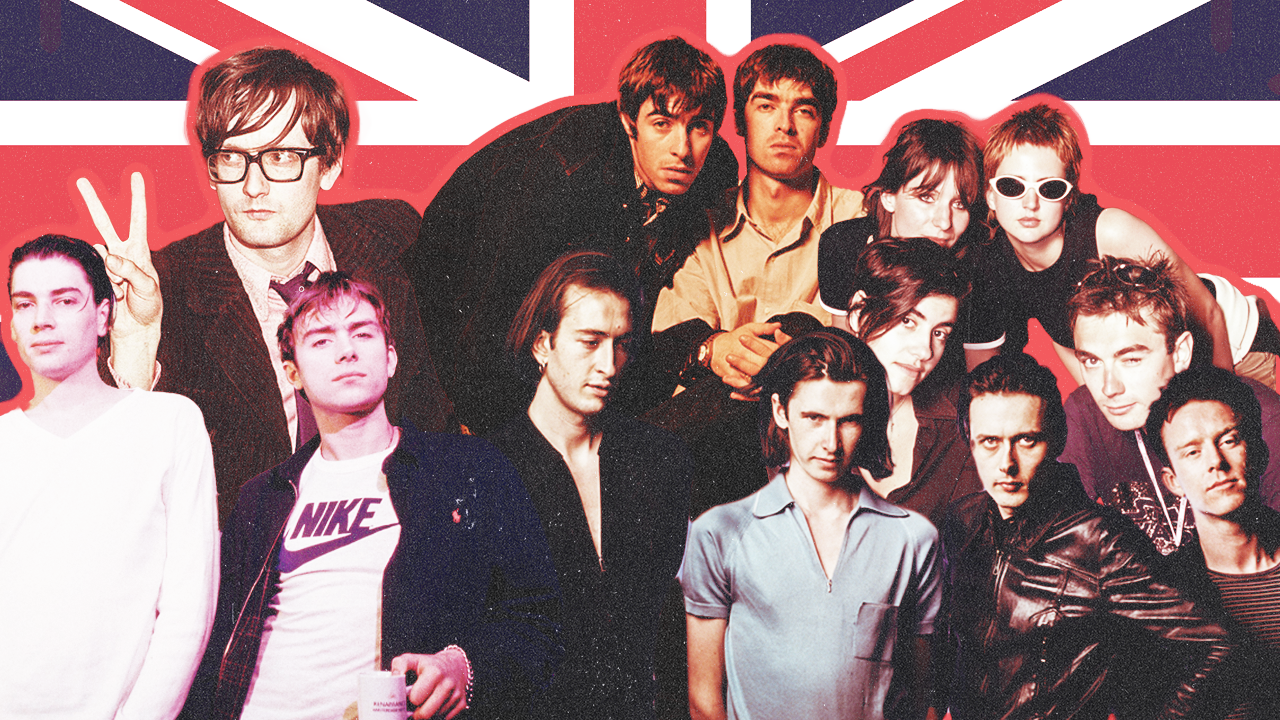There are some hurdles to overcome when putting together a Britpop playlist, the main one being that Britpop bands hate being called Britpop bands and will probably get the right hump that they’ve been put in a list with other Britpop bands, even a list appearing on such an esteemed and hallowed site such as this. Well, with the greatest respect Damon, Jarvis, Justine, Noel, Liam, Louise and Alan – sod off, you make the music, not the rules. I’m also not sure if there was an Alan in Britpop, it just seemed like the right name to end it on.
Then there’s the issue of, what is Britpop exactly? Who is Britpop? If it’s referring to the kaleidoscopic explosion of British music and culture in the mid-90s, then that would also take in the exhilarating punk-rave of The Prodigy and the euphoric uplift of Radiohead’s art-rock brooding – are The Spice Girls Britpop? No, they are not, and neither are the Prodge or the Head, as they should never be known.
Here, Britpop is referring to all those groups – and bloody hell, there was a lot of them – who emerged in the early 90s making 60s-tinged, melodic guitar-pop that could’ve only been made at that time, music born out of the drab 80s but made with the spirit of sunny optimism that spread across early 90s Britain. Stick on your Ben Sherman shirt and perfect that monkey walk, here’s five essential records to begin your journey into Britpop, with a playlist at the end.

Suede – Suede (1993)
It had not been a great start to the decade for British guitar music. The last exciting boom had been the Madchester/baggy explosion of the late 80s but that scene’s main players were in various states of disrepair – Happy Mondays derailed by drug issues, The Stone Roses beginning the long and winding road towards their second album. Into the vacuum came shoegazing, a wonderful genre if you want to talk about guitar pedals and sonic dynamics but not much to get the heart racing beyond that. Instead, it was rock bands from the US who were dominating - grunge had become a worldwide phenomenon - and it was into this setting that Suede came swaggering and initiated a hostile takeover. Theirs was music that celebrated Britishness at a time when no-one celebrated Britishness. Led by the charismatic, chiselled Brett Anderson, the band's debut captured the quiet, unsettling absurdity of mundane British life with a glam-rock showiness and a rattling, punky edginess. Combining the rock’n’roll recklessness of their 70s heroes – Bowie and Bolan chief amongst them – with the erudite observations and pop melodicism of The Smiths, Suede birthed Britpop. As if proving the point that everyone was waiting for something to happen, it went straight to top of the album charts. The spark had been lit.
Blur – Modern Life Is Rubbish (1993)
At the same time that Suede were making waves, a similar sense of connection to lost British pop was stirring in Colchester quartet Blur. Their 1991 debut, Leisure, was an indie-dance record whose baggy grooves seemed to be marching to the rhythm of the Madchester bands. But a disastrous US tour in 1992 shifted something in the mind of chief songwriter Damon Albarn and he came home determined to start making music that paid homage to classic British greats – revealingly, Albarn said that listening to The Kinks’ classic Waterloo Sunset was his only happy memory from the US jaunt.
It was an Anglocentric redirection that would come to define Blur, Albarn emerging as one of the sharpest songwriters of his generation. Parklife may (just) be a better album and contain bigger hits, but it never would’ve happened without Modern Life Is Rubbish. Their first collaboration with Smiths producer Stephen Street, it had all the hallmarks of what would become classic Blur: big singalong choruses, indelible guitar lines, a tug-of-war between melancholy and yearning and a rhythm section that could both keep it restrained and cut loose when they needed to. Lyrically, Albarn had set off on an exploration into the nooks, crannies and cul-de-sacs of Britain that is still going on three decades later. It’s no wonder that their recent triumphant live shows were filled with so many songs from Modern Life Is Rubbish, both its anthems and its album tracks. This is where the real Blur were born. The fledgling Britpop movement already had two classics to its name.
Oasis – Definitely Maybe (1994)
As Britpop blew up big and record shops sought to take advantage, Oasis’ manager Marcus Russell issued a strict edict to the band’s label Creation that they would not be part of any marketing campaigns bringing groups together under the Britpop banner. They were a rock’n’roll group, went the order, not a Britpop band. But whilst Russell was cleverly making sure Oasis weren’t tied in with a scene that would inevitably come to pass, the truth is that Oasis were both – more than that, they were the Britpop band who overshadowed all the rest. No other album sums up Britpop’s ambush of the mainstream the way that Definitely Maybe does. Their music melded a Beatles-y tunefulness with the snarl of the Sex Pistols and the message at the core of these songs was irrepressible – Rock’n’Roll Star, Live Forever, Slide Away, Cigarettes & Alcohol, Supersonic are all, at their core, songs about striving, breaking out and making it to somewhere better. The arrival of the Gallaghers signalled a sea change from the effete intellectualness of Brett Anderson and Damon Albarn, their barbed attitude giving way to Britpop as a vehicle for laddishness. For better or worse, Britpop was now intertwined with football and Loaded and lager, a bit of a sausagefest all told. Aren’t there any women round here? Oh yes, enter Elastica…
Elastica – Elastica (1995)
Fed up of her role in Suede, the band she formed with ex-boyfriend Brett Anderson, one that she described as “the token girl playing guitar at the back”, Justine Frischmann upped sticks and formed her own group in Elastica. It was immediately obvious she was born to be up front. Frischmann was a compelling singer/guitarist and a brilliant songwriter too: Elastica’s songs exhilaratingly captured the Britpop moment – the hedonism, the hangovers, the hangers-on and all the male posturing – with a louche insouciance, post-punk delivered with a withering roll of the eyes. Their self-titled debut is made up of songs that either sound like they’re racing to the end (Waking Up) or waiting for everyone else to catch up (Connection). It’s Britpop’s most pure lightning-in-a-bottle album. They couldn’t repeat the trick, though, taking five years to make a follow-up record and splitting up soon after. It doesn’t matter: Elastica’s legacy was already set.
Pulp – Different Class (1995)
Out of all the bands associated with Britpop, no-one had waited for their moment as patiently as Pulp. The Sheffield indie-rockers formed all the way back in 1978 and had already released four albums when Different Class made them overnight stars in 1995. It was as if everything had been leading to this, the previous year’s His ’n’ Hers demonstrating that they’d hit a songwriting stride. In that sense, there was an assuredness on Different Class that they’d previously been lacking. This was old school indie outsiderdom reworked for the masses – huge choruses tied to the wry observations of Jarvis Cocker, the eccentric maverick counterpoint to all the pretty boys. Nothing before or after summed up Pulp’s ability to do widescreen kitchen-sink drama as well as Common People, an immediate era-defining all-time classic. Different Class made them huge but, as it happens, the spotlight didn’t suit them – their next move was the unsettled, uneasy This Is Hardcore. They knew the party couldn’t go on forever, but Pulp thrived when the spotlight finally hit them.

